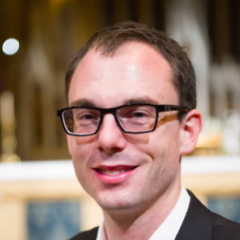As the curtain rises at the beginning of Act I, we are greeted with violent flashes of light, rocks strewn across the stage and the witches almost slithering among the rocks, as they make their prophecies to Macbeth that he will eventually become King, prompting him and Lady Macbeth in their murderous, Machiavellian pursuit of power. For me, the highlight of the production was the singing of the Opera Australia Chorus, who delivered the music with power and directness right from the opening scene with the witches, all the way through to the opera’s denouement with the death of Macbeth himself. At times, their singing was spine-chilling; when they lament the death of King Duncan and when they react to Macbeth's vision of the ghost of Banquo, their sound was rich and sonorous, always cutting to the emotional heart of the drama.
The opening witches’ scene was preceded by a very neatly and musically performed overture by the Australian Opera and Ballet Orchestra. In fact the orchestra was extremely impressive, performing with clarity and drama throughout the evening under the baton of Andrea Molino. Special mention should go to the brass section, who underpinned the battle scene, when Macbeth is defeated by Macduff at the end of the opera, with a wonderfully vivacious sound and with a great sense of ensemble.
The cast of soloists was of a very high quality, led by Elizabeth Whitehouse as Lady Macbeth. Vocally, she was the star of the evening. Her wonderfully free voice had an upper register which blossomed with ease and was full of expressivity. Her vocal performance was imbued with a great acting ability, enabling her to fulfill her character’s transition from a powerfully persuasive female figure through to her eventual insanity. Particularly moving was the sleepwalking scene when she relives the murder of Duncan in Act IV.
Perhaps the other vocal star of the evening was Daniel Sumegi as Banquo, although sadly Banquo dies relatively early on in the opera, so we were not able to hear as much of his singing as we would have liked! He has a fantastic, deep, resonant bass voice and is definitely a singer to look out for in future productions. There was also some expressive singing from Rosario La Spina as Macduff. His aria at the beginning of Act IV when he laments the death of his children was one of the highlight’s of the evening.
Macbeth is one of three Shakespearian operas written by Verdi. Dating from 1847, it is one of his earlier operas. Conversely, Otello and Falstaff, Verdi’s other two Shakespearian operas are the last two he ever wrote in 1887 and 1893 respectively. Standing in the shadow of these two great late operas, Macbeth has not always enjoyed a favourable reception history.
While the opera is perhaps not Verdi’s finest, we are reminded in the evening’s program that we should not forget that the work lays the foundations for his two late Shakespearian masterpieces, which owe much to Macbeth. Despite that, the opera is peppered with signs of Verdi’s genius which we all know and love and which came into full fruition in his later operas. This was brought out to the full in this production by a talented cast and opera company.


